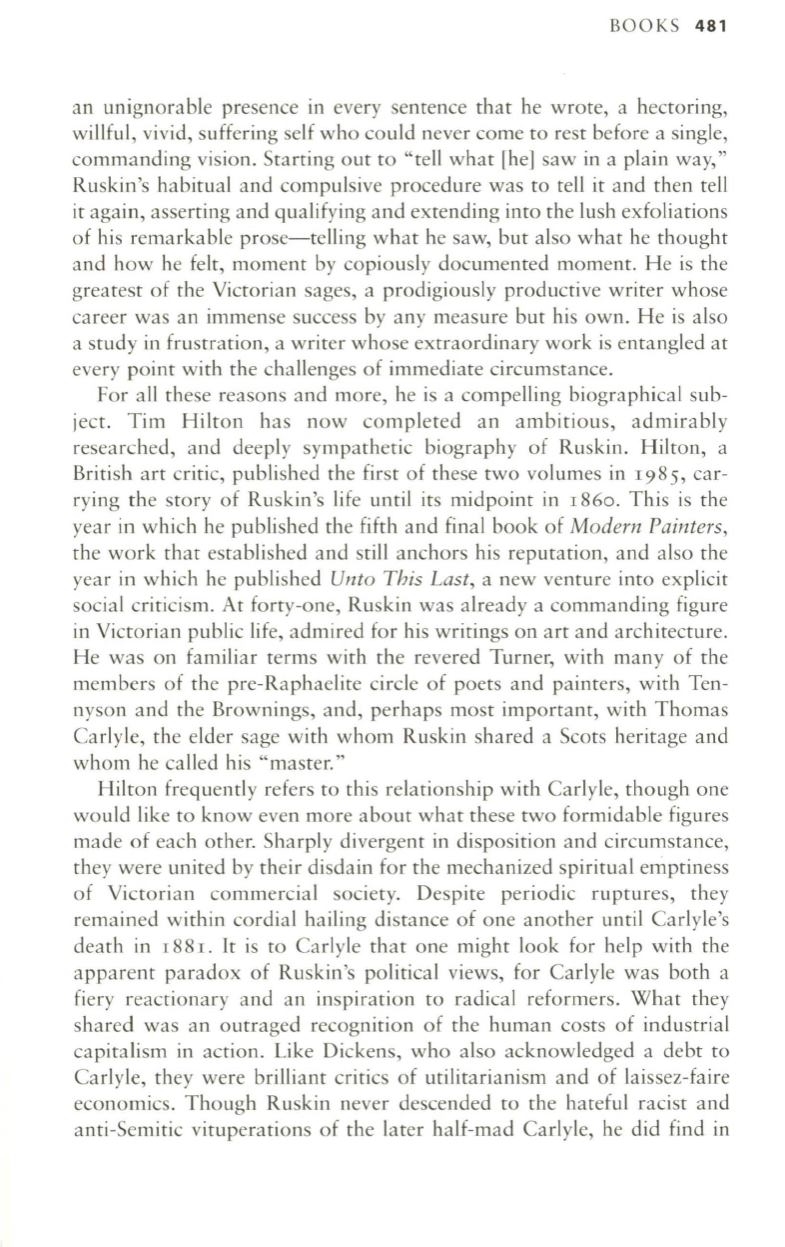
BOOKS
481
an unignorable presence in every sentence that he wrote, a hectoring,
willful, vivid, suffering self who could never come to rest before a single,
commanding vision. Starting out to "tell what [he] saw in a plain way,"
Ruskin's habitual and compulsive procedure was to tell it and then tell
it again, asserting and qualifying and extending into the lush exfoliations
of his remarkable prose-telling what he saw, but also what he thought
and how he felt, moment by copiously documented moment. He is the
greatest of the Victorian sages, a prodigiously productive writer whose
career was an immense success by any measure but his own. He is also
a study in frustration, a writer whose extraordinary work is entangled at
every point with the challenges of immediate circumstance.
For
all
these reasons and more, he is a compelling biographical sub–
ject. Tim Hilton has now completed an ambitious, admirably
researched, and deeply sympathetic biography of Ruskin. Hilton, a
British art critic, published the first of these two volumes in
1985,
car–
rying the story of Ruskin's life until its midpoint in
1860.
This is the
year in which he published the fifth and final book of
Modern Painters,
the work that established and still anchors his reputation, and also the
year in which he published
Unto This Last,
a new venture into explicit
social criticism . At forty-one, Ruskin was already a commanding figure
in Victorian public life, admired for his writings on art and architecture.
He was on familiar terms with the revered Turner, with many of the
members of the pre-Raphaelite circle of poets and painters, with Ten–
nyson and the Brownings, and, perhaps most important, with Thomas
Carlyle, the elder sage with whom Ruskin shared a Scots heritage and
whom he called his "master."
Hilton frequently refers to this relationship with Carlyle, though one
would like to know even more about what these two formidable figures
made of each other. Sharply divergent in disposition and circumstance,
they were united by their disdain for the mechanized spiritual emptiness
of Victorian commercial society. Despite periodic ruptures, they
remained within cordial hailing distance of one another until Carlyle's
death in
188!.
It
is to Carlyle that one might look for help with the
apparent paradox of Ruskin's political views, for Carlyle was both a
fiery reactionary and an inspiration to radical reformers. What they
shared was an outraged recognition of the human costs of industrial
capitalism in action. Like Dickens, who also acknowledged a debt to
Carlyle, they were brilliant critics of utilitarianism and of laissez-faire
economics . Though Ruskin never descended to the hateful racist and
anti-Semitic vituperations of the later half-mad Carlyle, he did find in


